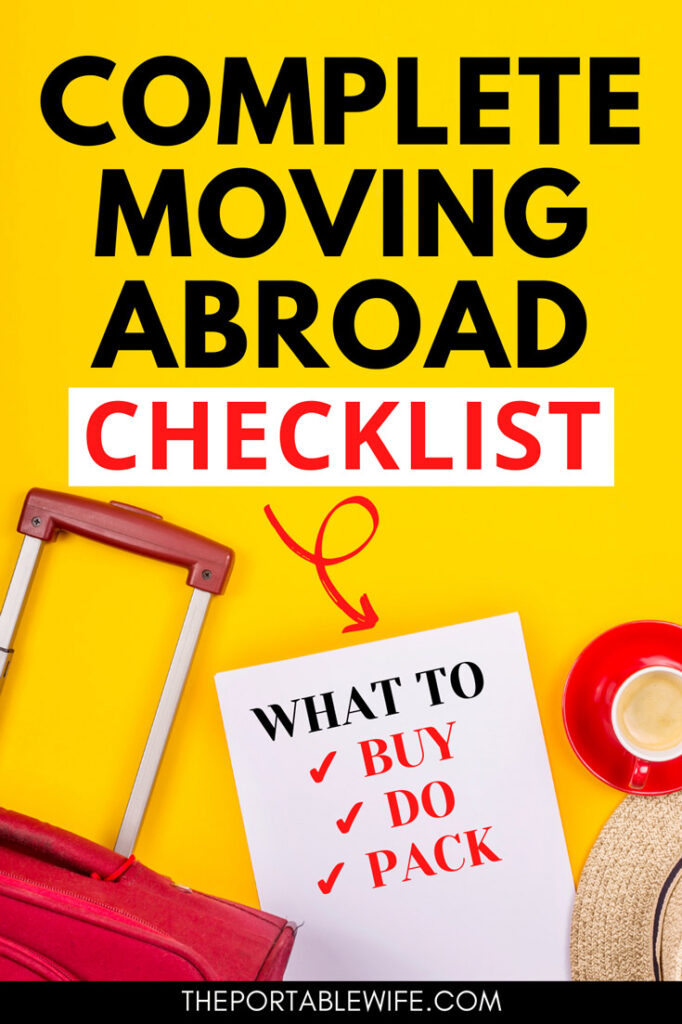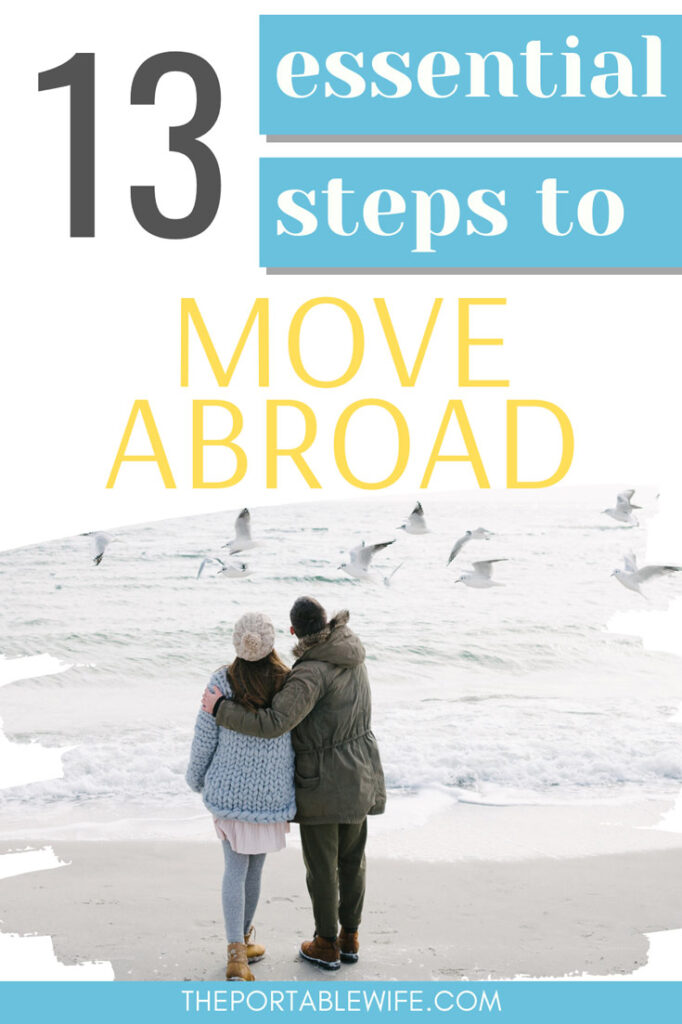The biggest mistake you can make when relocating overseas is not using a moving abroad checklist. Juggling visa applications, apartment searches, and farewell parties will leave you feeling utterly drained. And in those chaotic, stressful months leading up to the big day, you’ll barely remember to eat, let alone cancel your Hulu subscription that only gets used twice a year.
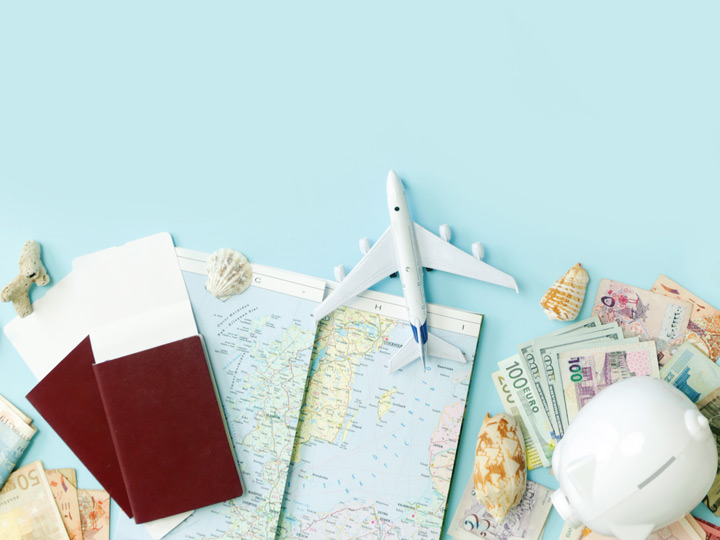
Before I moved from the US to London, I cobbled together my own version of an American moving abroad checklist. As a detail-obsessed person, I thought I had everything covered, all the way down to “take goodbye selfie in front of house”.
And then shortly after the move, my husband lost access to his US phone number and we were locked out of half our online accounts… So much for being prepared!
Fortunately, you get to learn from my past mistakes and new expat adventures. This list of things to do before moving to another country covers all the essential tasks, regardless of where you’re going or coming from.
This post contains affiliate links. As an Amazon Associate, I earn from qualifying purchases. For more information, click here.
Moving Abroad Checklist
- Apply for the right visa
- Research the cost of living
- Build up your emergency fund
- Make arrangements for your pets
- Downsize your stuff as you prepare to move abroad
- Carefully decide what to pack (and what you can’t)
- Review your tax requirements and retirement plans
- Sort out your banking at home and abroad
- Create a payment plan for every bill
- Purchase travel insurance
- Schedule doctor appointments and obtain prescriptions
- Set up mail forwarding
- Take photos when you move out
Looking for a printable (and more detailed) version of this checklist? Join my Patreon group for access to my entire resource library!
Apply for the right visa
Despite what TV and movies might have you believe, most people cannot pick up and move to a different country on a whim. Unless you’re an EU citizen moving to another EU country, in which case I’m very jealous, and you can skip to the next item on this moving abroad checklist.
RELATED: How to Move Out of America in 10 Steps
Every country has its own visa requirements with different rules and pathways depending on your current citizenship. Thus, no single blog post can help you navigate your own personal move.
However, I can tell you that not all visas are created equal. Some countries may have two or three visas that you quality for, but one may restrict how many hours you can work, and another may be the only option for permanent residency.
It’s critical that you do your research and apply for the right visa for your circumstances.
I can’t tell you how many people I’ve seen prepare to permanently move to the UK on a Tier 2 Intra-Company Transfer visa, only to discover that it doesn’t offer a path to permanent residency or citizenship. One of those people may have been me…
Before you apply for the first visa that will let you move to your desired country, you should be able to answer the following questions:
- How long is this visa good for?
- Can I renew it? How many times?
- Does it lead to permanent residency/citizenship (and does that matter to me)?
- Are there any restrictions on how many hours I can work, or the type of work I can do?
- Does it give me access to public benefits like healthcare, maternity leave, unemployment, etc.?
- What fees will I have to pay with my application?
Do digital nomads need visas?
With the digital nomad lifestyle on the rise, more and more people are learning the hard way that they can’t literally work from anywhere. Popular digital nomad havens like Malaysia and Thailand have created new visa rules to prevent infamous “border runs” for extended stays.
And many countries, including the US and UK, forbid you from doing work on a tourist visa, even if it’s a remote business. Border agents will question you, and if they discover you’re planning to work illegally, they will deny you entry and possibly ban you from ever entering the country again.
Always research the immigration and visa laws if you plan to live and work abroad, even if you only plan to stay for a couple months.
Research the cost of living

Calculating a rough budget is one of the most important things to do before moving to another country. And unless you look into the average cost of living, you won’t have any idea what you can afford on your salary/savings.
Numbeo is a great starting point for your research. But I’ve found Reddit, Quora, and Facebook to be even more helpful, because I can scan for posts from other people in similar living situations.
When I was trying to approximate our monthly expenses in London before our move, it was useful to read about other young couples’ budgets for groceries and utilities.
These websites are also good for finding neighborhoods that fit your budget and preferences for safety, fun, etc. Once you get some suggestions from locals, use an accommodation search tool like Zillow or Rightmove (every country has their own) to see exactly what you can get for your money.
You can take your research a step further by looking online at public transit fares, restaurant menus, internet packages, and other inevitable expenses.
Once you have an idea of your monthly expenses, record everything in a spreadsheet and compare it against your monthly salary or planned savings withdrawal. Hopefully you don’t come up short! But if you do, the easiest places to make cuts are usually housing and food.
Build up your emergency fund
Speaking of money, you definitely don’t want to move abroad with no savings. Surprise expenses, accidents, and unexpected complications can quickly derail your finances. And no one wants to start their new life abroad in credit card debt!
Here are just a few ways new expats can get into financial trouble:
- Your first paycheck is delayed a month due to slow payroll processing
- The apartment you wanted to rent was unsafe/misrepresented/a scam, and you’re living out of a hotel while you search for a new one
- You get injured before your company’s health insurance starts, and the hospital won’t treat you without upfront payment
The general rule of thumb is to have 3-6 months of living expenses saved for emergencies. I suggest leaning towards the higher end if you can, especially if your income is volatile (ex. freelancing) or you have dependents and can’t simply return to your home country if things turn sour.
Having an emergency fund can literally save your life. Making a few spending sacrifices in the months leading up to your move will be worth the safety net.
Also, don’t forget to save for moving expenses! We had over $20,000 in costs to move to the UK. Shipping, visas, flights, and buying new stuff adds up quickly.
Make arrangements for your pets
As a dog owner, looking into pet import laws was the very first item on my moving abroad checklist. From vaccination schedules to banned breeds, every country has unique rules for what and how pets can enter.
A quick online search for “bringing pets into [new country]” should bring up an official government website with the information you need. I would not recommend taking advice from any website other than the official government one, because import laws can and do change over time, and you don’t want to base your plans off of outdated information.
Here’s what you should be looking for when relocating pets abroad:
- Are there species or breed restrictions?
- Is there a mandatory quarantine period?
- What vaccines are required?
- Is there a specific vaccination timeline? Does it involve certified paperwork or blood titration tests?
- Are there restrictions on where or how my pet must enter the country (i.e. in the cargo hold, at certain airports, etc.)?
- What expenses or fees are involved for importing pets?
For countries with complex regulations and lengthy paperwork, you may want to partner with a pet relocation company.
To bring our dog from the US to UK, we had to follow a strict vaccination schedule and health certification timeline, and certain documents needed to be filled out in blue ink with some dates in dd/mm/yyyy format and others in mm/dd/yyyy…
Plus, there was the looming threat of denied entry or quarantine for a single mistake, and the logistical challenge of getting a German Shepherd and his enormous airline crate from Heathrow to south London.
Needless to say, we opted to hire a pet relocation firm to handle basically everything. All we needed to do was take our dog to a few vet appointments and mail some paperwork when our consultant told us to.
Ultimately, your decision should be based on what’s best for your pets. Consider their health, temperament, and any risks they may face in your new country before you plan your move.
Downsize your stuff as you prepare to move abroad
Paring down our possessions to a few suitcases and storage bins was a daunting task. Although we didn’t have a lot of stuff compared to most Americans, it’s still exhausting to account for every sock, spoon, and holiday decoration.
Some people think it’s easier to pack up and ship everything overseas. But unless you’re made of money, or your company is footing the bill (which will easily hit five figures if you include furniture), I highly recommend you get rid of the non-essentials and bring only luggage.
If this sounds impossible, don’t worry! I’ve written two extremely detailed guides on how to downsize before moving abroad, and how to sell all your stuff. These are the exact steps I used to downsize from a two-story house in Texas to a 700 sq. ft. London apartment.
Aside from saving a boatload of money on international shipping costs and customs fees, you can skip the tedious paperwork required for using third party companies to import your stuff. And I firmly believe living with less is one of the advantages of living abroad.
Trust me: striking this from your moving to a new country checklist is a win.
I also suggest you start the downsizing process as soon as you know your moving timeline. We began purging and donating stuff about three months before our move date. By not waiting until the last minute, you’ll free up your time and energy to focus on other pre-move logistics.
Save me for later!
Carefully decide what to pack (and what you can’t)
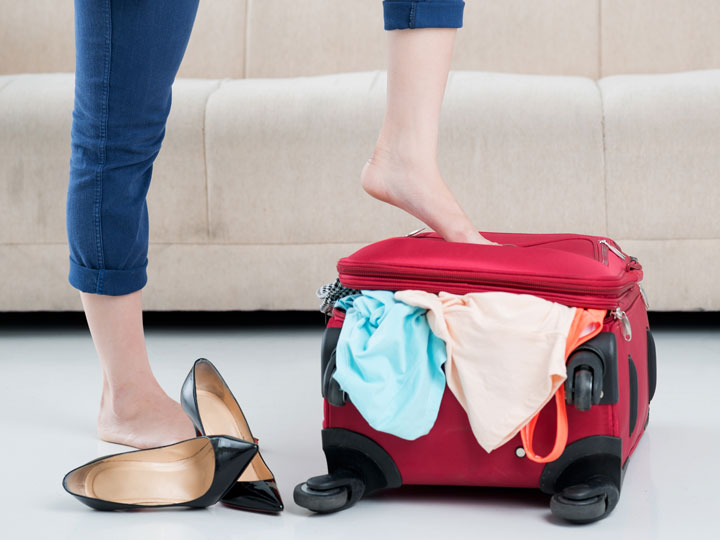
While I’m all for getting rid of as much stuff as possible, it would be foolish to leave behind literally everything. From sentimental possessions to electronics, there are some things that absolutely belong in your suitcase.
Moving overseas checklist essentials
- Important legal documents
- Prescriptions
- Travel adapter
- Portable power bank
- Sentimental items
- “First week” bag of clothes and toiletries
- Pet supplies
Check out my comprehensive moving abroad packing list for more!
In addition to the above essentials, there are certain items that make sense to bring. However, you need to assess the trade-off between bag space and the cost to replace the item.
For example, I have an expensive handheld Dyson vacuum that I wanted to take to the UK. If I sold it, I could have gotten maybe 30% of what I paid. And it would have cost even more to replace it in the UK, where electronics are more expensive than in the US. So I took it apart and packed it in a way that took up as little space as possible.
The other consideration is compatibility of electronics. Every electronic device has a range of voltage and hertz that it can accept. Too much voltage and it will fry. Too little and it won’t work properly (or at all).
Always check the voltage and hertz standards of your new country against your current electronics. While you can use a transformer or converter plug adapter (note these are different from travel adapters) to step the voltage up or down, they will reduce the lifespan of your devices and can even lead to shorts and fires.
Most modern electronics, including smartphones and video game consoles, can accept a range of voltages (usually 110-240v). But items with motors and heating elements, such as hairdryers, mixers, and coffee makers, are almost always designed to work with one voltage.
Finally, if you’re planning to bring your smartphone abroad, make sure it will work in your new country!
Americans who got their phones as part of their cellphone contract are routinely surprised when their phones won’t work abroad. Unfortunately, US carriers region-lock these phones. You’ll need to ask your carrier if they can “unlock” the phone for you, or purchase one that will work if they cannot.
Before we moved abroad, I bought a Google Pixel phone. Pixel phones have amazing photo quality, a speedy processor, and the ability to work anywhere in the world.
Review your tax requirements and retirement plans
It’s scary how many people leave financial planning off their moving to another country checklist. If I had a nickel for every time someone panicked about paying taxes or saving for retirement while abroad, I’d be a wealthy woman.
Every country has their own tax laws and regulations about foreign investments, so I can’t give much advice beyond this: do your research before you leave the country.
You should have a clear understanding of these things before you move:
- Will I need to file taxes in my home country? (FYI, American citizens are required to file a US tax return regardless of where they live.)
- What income is eligible for taxation (ex. Capital gains, interest, etc.)
- Is there a tax treaty or totalization agreement between my home country and new country?
- What taxes am I responsible for paying (if any)? What about my employer?
- Am I eligible to contribute to a pension fund in my new country? Can I opt out of contributions?
- What are my tax implications for investing money abroad, especially in tax-deferred accounts?
Sort out your banking at home and abroad
One of the first things to do when moving abroad is setting up a local bank account. Depending on where you live, this could be a simple task or a tedious process.
While some countries only require ID and a resident visa to open a new account, others have strict standards for proving your identity and local address. In the UK for example, we had to show two proofs of address from a prescribed list of acceptable documents.
Unfortunately, it takes awhile for you receive your first tax/utility bills, so many new residents can’t get a UK bank account until several weeks after they move!
Not having a local bank account can pose all sorts of problems, including not being able to pay utility bills. Thus, it’s critical to research what’s needed to open an account, and how quickly you can get the necessary paperwork.
In addition to local banking, you’ll need to sort out your existing finances before going abroad. Here are a few helpful tasks to complete:
- Set up paperless statements if possible
- Change your address
- Check if your debit card has foreign transaction fees
- Apply for international wire transfer permission (if required by your bank)
And if you don’t have one already, I highly suggest getting a credit card that has no foreign transaction fees. Many companies will not offer new residents a credit card, because you’ll have no credit history in your new country.
Managing your money abroad
One of the most common questions soon-to-be expats ask is how to move money between bank accounts without paying a fortune in exchange fees. Thankfully, there’s an easy and cheap solution:
Wise (formerly TransferWise) comes in handy all the time, whether its making a rental deposit or moving funds to cover student loan payments. And it’s way cheaper and faster than doing an international wire transfer from a traditional bank.
If you get paid in multiple currencies (hello digital nomads!), the Wise Multi Currency Account will let you send and receive money in over different 40 currencies. It even comes with a multi-currency debit card.
Open a Wise account today to get real exchange rates, speedy transfers, and ultra-low fees.
Create a payment plan for every bill
With all the logistics of an international move, it’s easy for a bill or two to slip through the cracks. Especially for annual subscriptions or those pesky “final bills” that come after you cancel a utility.
Take a moment to create a list of every single bill you pay in a year. This should include everything from your monthly Spotify subscription to your water bill.
Then, make a note next to each item of what will happen when you move abroad. Do you need to keep making payments, like a student loan bill? For services like Amazon Prime, will you transfer your account to the new country? Or will you need to cancel the service, like your gym membership or an electric bill?
Once you’ve noted your next steps, go back to the bills you need to keep paying, and plan out how to make payments abroad. For example, can you have direct debits moved to your credit card? Or will you need to transfer money back to your old bank account every month or so?
FYI, if you’re from the US paying off student loans, many providers will only let you pay via direct debit from a US bank account. In this case, Wise really comes in handy to transfer money with super-low fees.
Also, make a calendar appointmet to cancel the rest of your bills. You definitely don’t want to leave this moving abroad checklist item until the last minute!
Purchase travel insurance
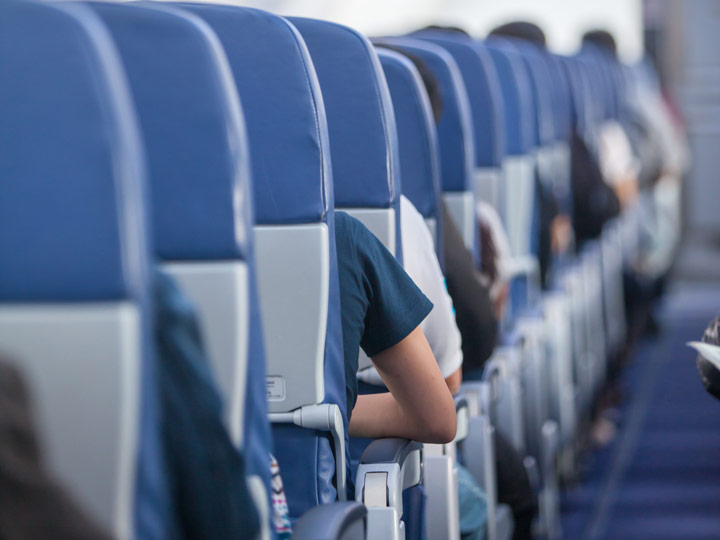
No matter how carefully you plan, something can always go wrong when moving abroad.
Entry dates get pushed back, luggage gets lost, jet-lagged bodies get sick… A lot can happen to derail your plans. And these challenges can end up costing you thousands of dollars in changed flights, replacement items, and uninsured doctor’s visits.
You need to protect yourself (and your wallet) before any international move. And travel insurance is the best way to do it.
Whether you obtain insurance from your credit card company, post office, or a broker, be sure to review the policy carefully and figure out what is and isn’t covered. For example, many companies offer tiered policies that–at the lower end–limit how much they’ll cover for things like electronics or medical care.
Schedule doctor appointments and obtain prescriptions
Accessing the same medical care and prescriptions you had back home may not be possible once you’re living abroad. Always take time to schedule and attend doctor’s appointments before you leave, especially if you take medication or have a chronic health condition.
When it comes to prescriptions, talk to your doctor (and pharmacist) about your plans. The medication you’re on may not be available or even legal in your new country. So, you might need to switch prescriptions or see about getting a longer supply if you’re not going to be abroad for long.
Traveling abroad with medication
Always pack medication in your carry-on luggage, and leave everything in the original packaging with accompanying prescription).
Here are a few appointments you may want to make:
- Well women’s visit
- Dental check-up and cleaning
- Specialist care
- Mental health
Also, it’s helpful to request a copy (preferably digitally) of your medical records. That way, you can share them with your new doctors at your first appointment.
How to Find the Best International Health Insurance for You
Even in countries with universal health care, buying an international health insurance plan makes sense for a lot of expats (especially Americans).
But between deductible rules and coverage areas, it’s hard to know which plan is right for you.
Luckily, the brokers at International Citizens Insurance can help you find the right plan for your specific situation. They will do the research, compare plans, and review options with you. A good broker will save you so much time, and best of all, there is no cost to you!
With International Citizens Insurance, you’ll have your pick of plans from the best international health insurance companies (Cigna, GeoBlue, Aetna, etc.). A dedicated agent will answer all of your questions, walk you through the terms and coverage, and make adjustments so that you end up with a plan and premium that works for you.
Set up mail forwarding and update your address
Having your mail forwarded to a family or friend is a major help when you move abroad. From utility bill refund checks to random legal letters (like the time I received a 7-year-old tax bill from Philadelphia), there will be times where you’ll wish you had access to your mail.
If you’re somehow able to have your mail forwarded directly to your new address, great! But at least in the US, foreign forwarding addresses aren’t allowed.
Outside of the postal service, you should change your address with important places like your bank and anywhere else that sends you sensitive information.
Take photos when you move out
You’ve finally made it to the last item of the moving abroad checklist! Time to race out of your home and onto the plane, right? Unfortunately, a hasty escape could cause you a lot of headache.
While I’d like to believe most landlords are kind, ethical people, there are unscrupulous ones who will seize any opportunity to keep your security deposit. That includes blaming you for damage their own maintenance and cleaning crews did after you moved out, or even fabricating damage like carpet stains.
When you’re a thousand miles away trying to start life in a new country, the last thing you want to worry about is disputing charges from your old landlord.
To protect yourself (and your sanity), you need to take detailed, quality photos of every room on your way out the door. You should also photograph any minor damage caused during your tenancy, from baseboard nicks to dead patches in the grass.
Having photographic evidence–even of damage you caused–can protect you from false claims. If the landlord tries to take your $1,000 deposit to re-carpet the living room because of that horrible stain you (i.e. the cleaning company) left, you can easily dispute it.
This also goes for homeowners who sold their property. While there’s usually a final walkthrough inspection before closing, you could be held liable for damage caused between the closing date and the new owner’s move in date.
Oh, and remember to take a goodbye selfie in front of your place before you leave!
Other things to do before moving abroad
- Decide if moving to another country is right for you
- Learn how to make friends while living abroad
- Make a plan for staying connected with friends and family
- Research the difficulties of moving to another country and how to adapt to a new culture
- Start studying the local language for free with DuoLingo or Memrise
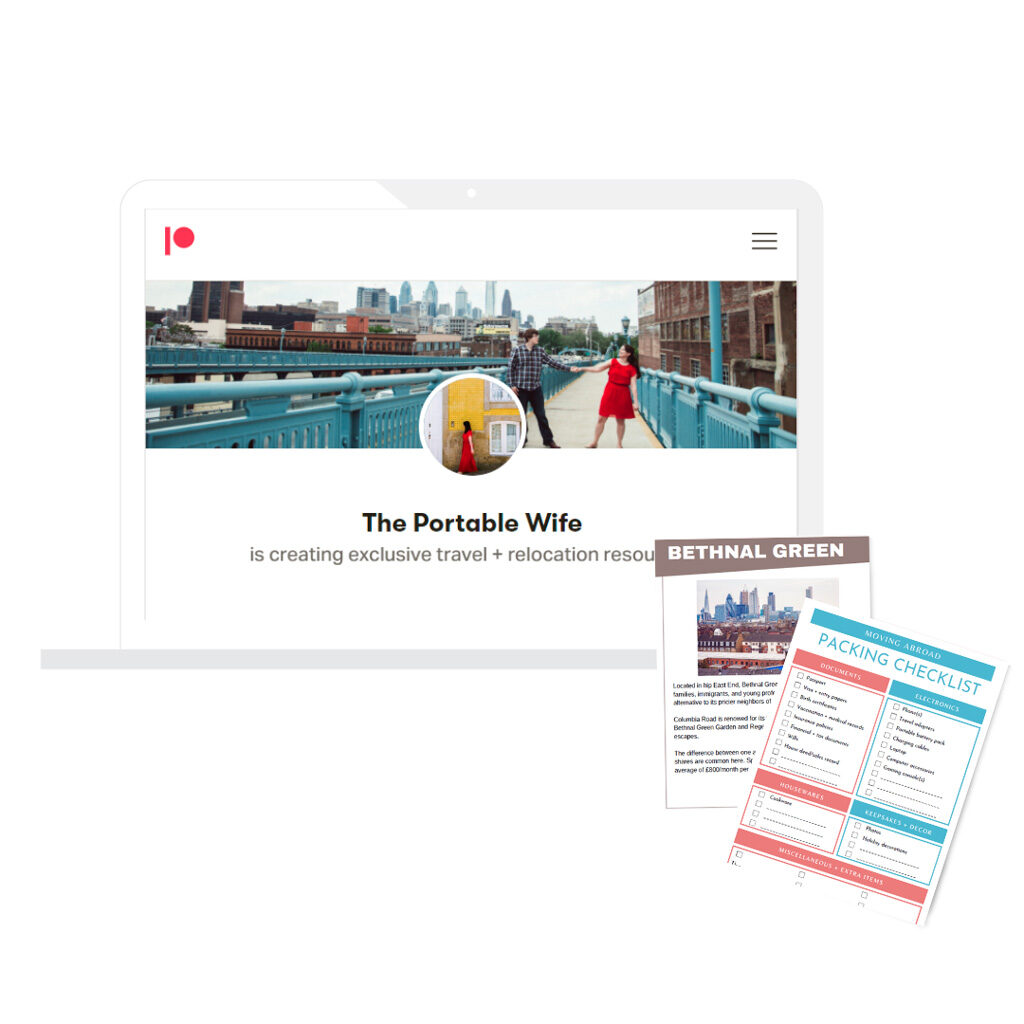
Want more travel + relocation tips?
Become a member of my Patreon group for exclusive access to my resource library, including:
- Printable packing lists for moving + travel
- Money-saving tips
- Insider travel guides
- And much more


